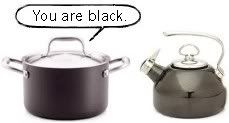From the Guardian Unlimited (UK) comes this headline: Conservapedia - the US religious right's answer to Wikipedia.
From the article:
Although entries on Wikipedia are open for anyone to edit, conservative campaigners say they are unable to make changes to articles on the site because of inherent bias by its global team of volunteer editors. Instead they have chosen to build a clone which they hope will promote Christian values."I've tried editing Wikipedia, and found that the biased editors who dominate it censor or change facts to suit their views," Andy Schlafly, the founder of Conservapedia, told the Guardian. "In one case my factual edits were removed within 60 seconds - so editing Wikipedia is no longer a viable approach."
Whereas no one is permitted to sign up to edit Conservapedia at all. I know; I've tried. Oh, and check out this comparison between some descriptions given at Wikipedia and their counterparts at Conservapedia (from the Guardian article):
Dinosaurs
Wikipedia: "Vertebrate animals that dominated terrestrial ecosystems for over 160m years, first appearing approximately 230m years ago."
Conservapedia: "They are mentioned in numerous places throughout the Good Book. For example, the behemoth in Job and the leviathan in Isaiah are almost certainly references to dinosaurs."
US Democratic party
Wikipedia: "The party advocates civil liberties, social freedoms, equal rights, equal opportunity, fiscal responsibility, and a free enterprise system tempered by government intervention."
Conservapedia: "The Democrat voting record reveals a true agenda of cowering to terrorism, treasonous anti-Americanism, and contempt for America's founding principles."
No, they're not biased at all, are they?

Just for the sake of interest, here are Wikipedia's entry about Conservapedia and Conservapedia's article about Wikipedia.







